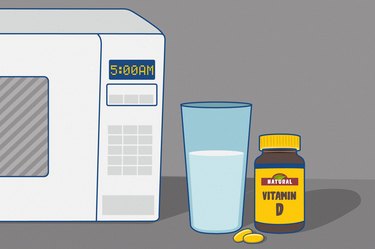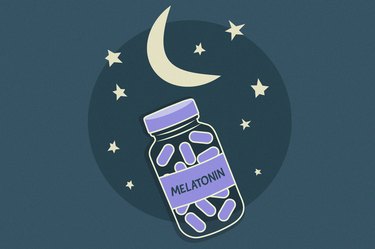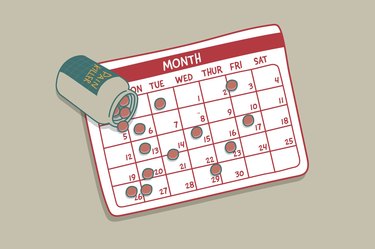
Vitamins are an efficient way to add nutrients into your diet that you might be lacking. You can take them as soon as you wake up or before you go to bed, but the best time to take vitamins actually depends on the vitamin.
Popping those supplements first thing in the morning can be a good strategy to stay consistent, but taking them on an empty stomach might have some drawbacks. Here's how a registered dietitian says you can maximize your vitamin intake and avoid an upset stomach.
Video of the Day
Video of the Day
Water-Soluble vs. Fat-Soluble Vitamins
Before you decide whether or not to take a vitamin without food, it's best to know how your body will absorb it.
"You need to determine if they are water- or fat-soluble," says Crystal Scott, RD, a registered dietitian at Top Coaching Nutrition.
Water-soluble vitamins include vitamin C and B-complex vitamins, according to the Harvard T.H. Chan School of Public Health. These are vitamins that will be absorbed by your body quickly and not stored. Vitamins A, D, E and K are considered fat-soluble, which means they dissolve in fat and can be stored in the body's tissues.
"If you're taking water-soluble vitamins, like B vitamins and vitamin C, those can be taken on an empty stomach. They're likely not going to cause any GI problems," Scott says. "With fat-soluble vitamins you need to take it with food, and that's for reabsorption."
As the name suggests, a fat-soluble vitamin is most effective when taken with a source of fat. This allows them to be stored in the body, otherwise the nutrients will pass right through your digestive system.
Tip
Before you begin taking any kind of supplement, it's a good idea to talk to a health care professional. They can help you understand exactly what you're putting in your body and the best way to take it (if at all).
The Risks of Taking Vitamins on an Empty Stomach
1. Your Stomach May Hurt
An upset stomach is a common side effect after taking vitamins without any food. As the vitamins pass through your intestines, your stomach can become irritated if there's nothing in there to coat it, according to the Cleveland Clinic.
You can prevent this by having at least a snack before taking your supplements, like a piece of toast or a small piece of fruit. This is true even for people who usually skip out on breakfast.
"It doesn't mean they have to eat a large meal, they can eat something small just to avoid GI upset," Scott says.
2. You Could Have Other GI Symptoms
On top of an upset stomach can be side effects like nausea, vomiting and diarrhea. Yup, being diligent about your vitamins just might backfire if you're taking too many at once or skipping actual food.
Scott recommends taking a good look at how many supplements you're taking. Then, consider splitting them up if having them all at once is causing GI issues.
"That [might] look like taking B vitamins in the morning, then maybe iron and vitamin C later on," Scott says. "Typically B vitamins are something you definitely want to take on an empty stomach, especially for those individuals who may have a B12 deficiency, just for maximum absorption."
Because B vitamins are water-soluble, you can take them with or without food any time of day. For someone who has a B12 deficiency, taking them on an empty stomach will allow them to absorb faster.
3. You Might Compromise Vitamin Absorption
As Scott mentioned, some vitamins (usually the fat-soluble ones) need a little extra support to be absorbed into the body.
She recommends taking fat-soluble vitamins (remember, those are A, D, E and K) with a fat source like avocado or coconut oil.
Tip
Keep in mind that supplements shouldn't be the only thing you're relying on to get in daily nutrients. Most vitamins are naturally found in food, like calcium in dairy products, leafy greens and sardines or iron in red meat, legumes and shellfish, per the Cleveland Clinic.
So, How Bad Is It Really to Take Vitamins On an Empty Stomach?
It all comes down to the kind of vitamins in your cabinet and how your body handles them. Water-soluble vitamins should be OK without food, as long as you're not taking too many.
But if you're having stomach troubles, a small morning snack like apple slices and peanut butter or avocado toast could help solve the issue. If eating first thing in the morning isn't happening, switch up your timing and try taking your vitamins in the evening instead.
GI issues could also be a sign of a bigger problem than taking vitamins on an empty stomach. If you're experiencing stomach upset and taking your vitamins with food doesn't help decrease it, consider talking to your doctor to help identify the problem.
Was this article helpful?
150 Characters Max
0/150
Thank you for sharing!
Thank you for your feedback!
Is this an emergency? If you are experiencing serious medical symptoms, please see the National Library of Medicine’s list of signs you need emergency medical attention or call 911.



